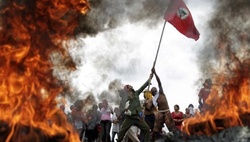
The new neoliberal land reforms could spark even more protests against Brazil's coup government by groups like the MST. (Photo: Reuters)
Brazil coup government to legalize foreign land grabbing
The expected lifting of foreign land ownership will be a windfall for the timber, soy and sugar industries -- and a nightmare for campesinos.
Brazil's government plans to lift current limits on foreign ownership of agricultural land, Secretary of Investment Moreira Franco, the person behind privatizations for the new administration, announced Wednesday.
"This proposal represents the interests of an alliance between multinational agribusiness corporations, foreign pension funds and the Brazilian rural oligarchy," Maria Luisa Mendonça, director of Brazil's Network for Social Justice and Human Rights, told teleSUR. "It will increase the enormous land concentration in the country and its dependency on agricultural commodities based on mono-cropping for export."
Franco called the restriction on sales of agricultural land to foreign individuals and companies "nonsense" and said Senate-imposed interim President Michel Temer will reconsider the issue. "The government will discuss the issue, see how it can solve this. It is something completely unreasonable," added Franco.
The announcement follows the country's Landless Workers Movement's, or MST, promise to launch a new wave of land occupations. Land ownership in Brazil is already one of the most unequal in the world, with just 1 percent of the population owning 45 percent of the land. This new policy threatens to exacerbate this problem.
"It will be devastating for small farmers and for food production in local markers. It will increase environmental destruction and pollution of water sources," said Mendonça.
The restriction on foreign ownership was adopted in 2010 by former President Luiz Inacio Lula da Silva. The MST have long been allies of Lula and deposed President Dilma Rousseff's Workers' Party.
Lula's administration was concerned at that time that countries such as China could take control of large segments of arable land in Brazil.
Rules overseeing deals were changed to limit the amount of land foreign investors could buy. Formalities with documentation were increased, making deals much more complex.
Companies in Brazil's commodities sector have long lobbied for a review of the rules, to allow for more investment to flow into the country, especially in the timber industry. The pulp, sugar and soy industries are among those defending the end of restrictions.
"Currently, the main interest of agribusiness is not the production of a particular agricultural commodity, but the control over land and natural resources for speculation," added Mendonça, also a professor in the international relations department at the University of Rio De Janeiro. "Land, as an asset, can serve as a 'material' base to increase the circulation of financial capital."












